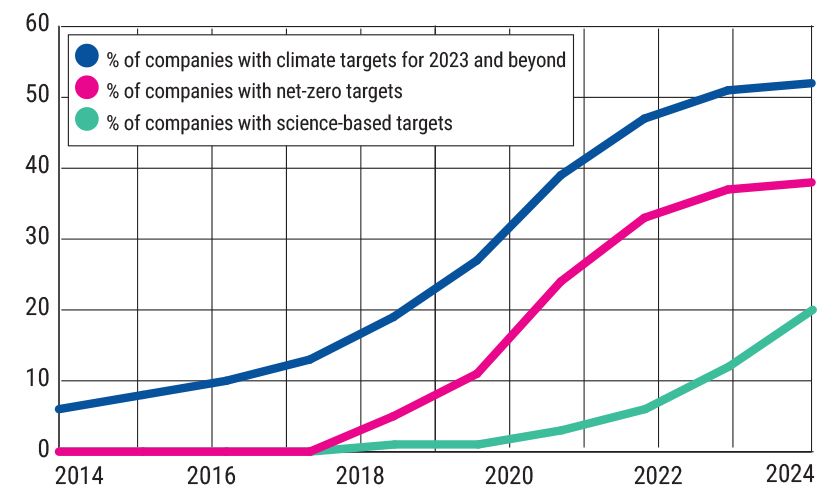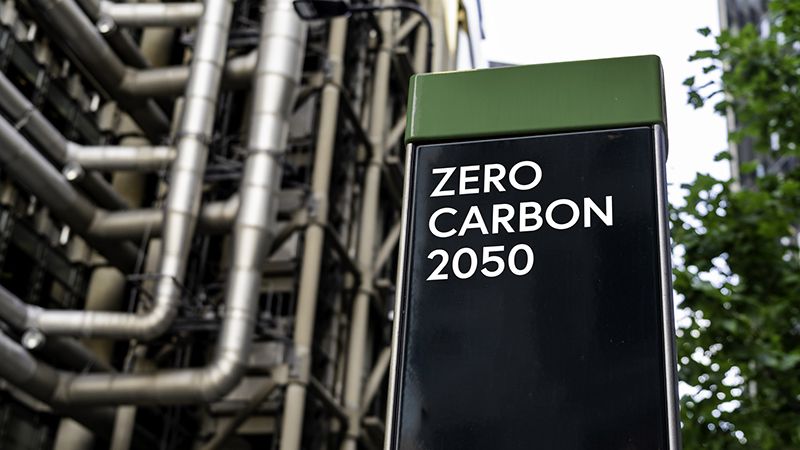More listed companies are setting science-based targets, and emissions disclosures are growing, but companies’ decarbonisation trajectories still place them on a path to warm the planet by 3 degrees celsius, the latest MSCI Net-Zero Tracker report has revealed.
In the April review of the progress of publicly listed companies in the MSCI ACWI index, which has 2,841 constituents across developed and emerging countries, the research found one fifth of listed firms have set science-based pathways to align their greenhouse gas (GHG) emissions with net zero by 2050. This is an increase on last year by eight percentage points. Overall, nearly 38% of listed companies have set net-zero targets in place – a one percentage point increase on last year – and just over half have disclosed an emissions-reduction commitment.
MSCI also reported nearly 60% of listed companies globally disclosed their Scope 1 and Scope 2 emissions as of 31 January 2024 – an increase of 16 percentage points over the past two years. Further, nearly 42% reported at least some of their Scope 3 emissions – a rise of nearly 17 percentage points over the same timeframe.
However, despite the progress, MSCI estimated listed companies are on track to burn through their share of the global carbon budget for limiting average temperature increases to 1.5 degrees celsius by July 2026. Their decarbonisation trajectories place them on a path to warm the planet by 3 degrees celsius above pre-industrial levels this century, roughly double the 1.5 threshold science indicates would prevent the worst effects of global warming.
Narrowing down, MSCI said 38% of companies are on a pathway to keep warming to 2 degrees or below, while 11% are aligned with a 1.5 degrees temperature rise.
MSCI highlighted there is room for listed companies to rein in the worst impacts of a warming climate.
“To limit warming to 1.5 degrees, companies would need to collectively cap future Scope 1 emissions at 28.9 gigatons (gt) of CO2e emissions by 2050,” the report said. “Without any change to their current emissions of roughly 11.8gt a year, companies would deplete their remaining emissions budget in two years, five months. To limit warming to 2 degrees, listed companies would need to collectively cap future Scope 1 emissions at 200gt of CO2e by 2050. Without any change to their current emissions, companies would deplete their remaining emissions budget in 16 years, 11 months.”
Share of listed companies with climate targets by target type

Narrowing disclosure gap
MSCI is also hopeful the recent finalisation of climate disclosure rules in the US by the Securities and Exchange Commission (SEC) could help to narrow a global disclosure gap at some of the world’s largest disclosure companies.
“The largest US-listed companies will be required to publish their material Scope 1 and 2 GHG emissions and other climate-related financial information annually under rules adopted in March by the SEC. The measures are designed to standardise disclosure of climate-related information available to investors.
“The rules could help to narrow a global disclosure gap: only 45% of US-listed companies currently disclose Scope 1 and 2 emissions, compared with 73% of listed firms in other developed markets. The rules also require disclosure of climate-related physical and transition risks that are reasonably likely to have a material impact on the company in the short or long term.
“The requirement will not catch all companies off guard. A majority of US-listed companies in emissions-intensive sectors like utilities, materials and energy are already disclosing their Scope 1 and 2 emissions, as are companies in consumer staples.”
Linda-Eling Lee, head of MSCI Sustainability Institute, commented on the Net- Zero Tracker review’s findings: “The report paints a mixed picture on corporate climate ambition. More listed companies are setting science-based targets, with one-fifth now pledging to reduce their financially relevant emissions in line with global climate goals.
“Still, the clock is ticking, and companies would need to decarbonize even faster to align with global goals. Our analysis shows that on their current trajectory, companies would burn through their share of the global carbon budget for holding warming to 1.5 degrees celsius by July 2026.”








